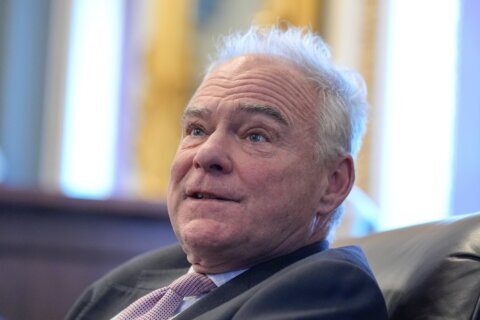The full House votes Thursday on a bill to make D.C. the 51st state and Majority Leader Steny Hoyer says he’s confident it will pass, even though Republicans have narrowed Democrats’ majority since the 2020 election.
The House last year passed the bill sponsored by D.C. Del. Eleanor Holmes Norton by a margin of more than 50 votes. It was the first House vote on a D.C. statehood bill in more than a quarter of a century.
Democrats still control the House, but only by a margin of 218-212.
Hoyer said Wednesday that the political atmosphere has changed in other important ways, including several factors that favor D.C. statehood.
“Things are different than they were last year,” Hoyer said. “First of all, we have a president of the United States who says he wants to sign this bill. Secondly, we have a majority leader of the United States Senate who wants to see this bill passed.”
Hoyer and Norton spoke at a news conference at the Capitol Wednesday ahead of the House vote, along with House Speaker Nancy Pelosi, Rep. Carolyn Maloney, D-N.Y., and Sen. Tom Carper, D-Del., who’s leading the effort to get votes in the Senate.
The Democratic lawmakers acknowledged that no Republicans have signed onto the bill and that it faces stiff GOP opposition in the Senate.
But Hoyer noted that with the support of Senate Majority Leader Chuck Schumer, the bill could eventually come up for a Senate vote once it passes the House. That did not happen when Sen. Mitch McConnell, R-Ky., was the majority leader.
The legislation would still need to get 60 votes in the Senate to overcome a likely filibuster, an uphill climb because there is no Republican support. Hoyer and Norton both oppose the filibuster and believe that it will ultimately be eliminated, though that appears to be unlikely in the near future.
Also, not every Democrat in the Senate has signed onto the measure, though it has 44 co-sponsors.
Despite uncertainty related to the Senate, supporters of the statehood bill view the latest House vote as another historic step in the effort to get D.C.’s more than 700,000 residents full voting representation in Congress.
While President Biden has previously indicated his support for statehood, the White House this week affirmed its backing in a formal statement.
Congressional Republicans oppose the bill on a number of grounds. While they have made several legal and constitutional arguments, from a political standpoint, the reason is clear: D.C. votes overwhelmingly for Democrats.
If the District were to become Washington, Douglass Commonwealth, as the state would be called, it’s likely voters would elect two Democratic U.S. senators and a Democratic House member.
Democrats have a narrow edge now in the Senate, which is divided 50-50, with Vice President Kamala Harris potentially providing the deciding vote on legislation.








